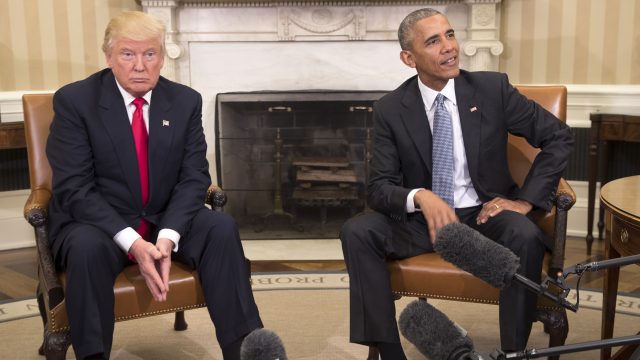Trump Isn’t Handling General Motors Any Better Than Obama Did

FILE -- President Barack Obama and President-elect Donald Trump in the Oval Office of the White House in Washington, Nov. 11, 2016. In a new book, President Trump repeats his unfounded claim that President Obama was complicit in spying efforts against him. (Stephen Crowley/The New York Times)
In the dawn of the Obama administration General Motors, hit hard by declining sales and the Great Recession, went to the federal government for help.
The Obama administration obliged, arguing that it would be a good deal for the American taxpayer. On top of billions in straight-up bailouts, President Obama gave GM some $30 billion for a 60 percent equity stake in the company. “American taxpayers are now positioned to recover more than my administration invested in GM,” President Obama predicted.
That didn’t happen. The taxpayers lost some $11.2 billion from Obama’s investment, and critics of the deal began deriding GM (not unjustly) as Government Motors. And the Chevy Volt that Obama said he’d be buying when he left office? The one he described as the car of the future? Well, GM isn’t making them any more.
The Obama administration’s approach to the woes of General Motors was all wrong. It turned out bad for the taxpayers and, one could argue, bad for General Motors as well. Had the company not been propped up by the federal government, might they have focused their efforts to resuscitate their company on things that might actually work? As opposed to things pleasing to politicians? And avoided scorn from resentful taxpayers in the process?
But if Obama critics were right in their opposition to his handling of General Motors, is the Obama critic currently in the White House doing any better?
General Motors is again on the ropes, announcing massive layoffs and the shut down of several North American facilities, and President Trump’s response really isn’t any better than Obama’s was.
While President Obama offered GM a sort of golden parachute, Trump is looking to use government subsidies to bully the company into more politically palatable decisions. With Twitter as his chosen medium, naturally:
Very disappointed with General Motors and their CEO, Mary Barra, for closing plants in Ohio, Michigan and Maryland. Nothing being closed in Mexico & China. The U.S. saved General Motors, and this is the THANKS we get! We are now looking at cutting all @GM subsidies, including….
— Donald J. Trump (@realDonaldTrump) November 27, 2018
….for electric cars. General Motors made a big China bet years ago when they built plants there (and in Mexico) – don’t think that bet is going to pay off. I am here to protect America’s Workers!
— Donald J. Trump (@realDonaldTrump) November 27, 2018
This is what happens when big business becomes a political football. General Motors, though an egregious example, is hardly in unique circumstances. Our politicians spend a lot of time propping up businesses, or trying to manipulate their choices, all toward political ends.
What would be preferable is creating a fair and reasonable tax and regulatory environment, and then letting these businesses succeed or fail based on their own choices and the vagaries of the marketplace.
The headwinds that GM is facing right now have less to do with politics, and the laws produced by the political process, than changes in our society. Americans just aren’t buying as many cars as they used to. For companies like General Motors, foreign markets are where the growth is. Thus it makes sense for GM to move their operations to those emerging markets, and from a slowing market like here in America.
That’s reality, and the politicians ought to let it happen instead of spending billions on manipulations aimed at propping up an increasing anachronistic status quo.




